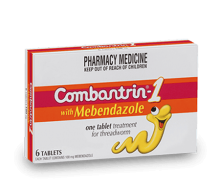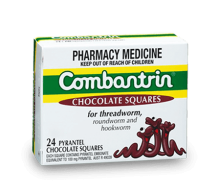Children with Worm Infections
There are several types of worms that can cause problems in children, including threadworm, roundworm, strongyloides, whipworm and hookworm. As threadworm is the most common worm infection in Australia and New Zealand (with other worm types considered quite rare), this information focusses on this type of infection.
Children should be free to take part in the rough and tumble that is part and parcel of growing up. But whether it's joining in team sports at camp, playing outdoors, or getting ready to go back to school and see their friends after a holiday, there are countless circumstances where children can potentially be infected.
Threadworm infections are a natural part of growing up for many children and their families. Sharing is an integral part of childhood, and sharing may come with worms – but that shouldn't stop them from experiencing those playful, inquisitive, formative moments that are all part of being a kid.
Treating threadworm infections
The faster the symptoms of a worm infection can be identified and treated, the faster kids can get back to having fun and being themselves. For caregivers, that means brushing up on the various different types of worms, as well as being prepared with COMBANTRIN® - an effective treatment for threadworm, and the rarer worms hookworm and roundworm.
COMBANTRIN® or COMBANTRIN®-1 should be administered as soon as symptoms of a threadworm infection show themselves – and all other family members should be treated at this point too. To be certain the infection has been dealt with, a follow-up treatment two to four weeks later is also recommended if symptoms are still present - to rid the body of any new adult worms that may have developed within that timeframe from the eggs and larvae.
Find out more about preventing reinfestation of worms
The effects of worm infections
Some worm infections, can cause mild symptoms like trouble sleeping, lack of appetite and general irritability – unpleasant experiences, certainly, but not life-threatening. Some worm infections don't come with any symptoms at all.
In order to act fast when the first signs of worms occur, caregivers should always be prepared with the relevant treatments on hand – such as COMBANTRIN®, so the infection can be addressed.
And remember: threadworms are all part of growing up
Many caregivers fret that a worm infection means they've not been keeping their children or home clean and hygienic enough – but the reality is that it is part and parcel of being a child and not as a result of poor hygiene habits. Kids love to play in the dirt, they love to interact closely with their friends, and they're always sharing – whether it's sharing toys, sharing hugs or even sharing a high-five. Rather than encouraging children to stop sharing and inhibit their social development, the best option is to ensure you have access to the appropriate deworming treatments and be prepared for any eventuality.
Check out COMBANTRIN®'s range of products to suit the whole family.





